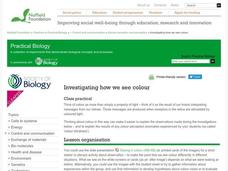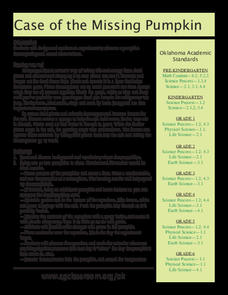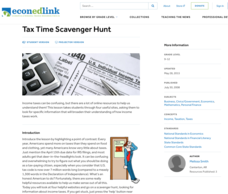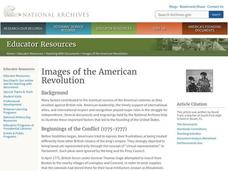Illustrative Mathematics
Seeing is Believing
How many visual models can be used to show multiplication? Three basic kinds of models can be used to represent and explain the equation 4 x (9 + 2). The commentary section provides description and graphics to explain the set model,...
Curated OER
Rosencrantz and Guildenstern Are Dead: Reader's Theatre
Plays are meant to be performed! After reading the entire play, invite your learners to choose a scene from Rosencrantz and Guildenstern Are Dead that relates to earlier class discussion about characters, motifs, and themes to interpret...
EngageNY
Bean Counting
Why do I have to do bean counting if I'm not going to become an accountant? The 24th installment of a 35-part module has the class conducting experiments using beans to collect data. Learners use exponential functions to model this...
Nuffield Foundation
Investigating How We See Colour
Can you eyes be fooled into seeing colors that aren't actually there? Budding scientists view a presentation that addresses this topic. They explore how their eyes interpret color through the retinas and messages sent to the brain. They...
State Bar of Texas
Miranda v. Arizona
You have the right to remain silent—but why? Scholars analyze the nature of what has become known as the Miranda Rights. A short video along with paired group work and discussion opens the issue of the rights of the accused upon arrest....
Curated OER
Discussion Questions for Shakespeare's Julius Caeser
Do not let Julius Caesar be Greek to your pupils. Rather, make the play a dish fit for hungry minds. Encourage your class members to lend their ears to a series of rich discussion questions so that they can become masters of the play, as...
Curated OER
The Carbon Cycle
Here is an interesting science lesson. Pupils discover that carbon, just like water, is absolutely necessary for all living things to survive. They study how it cycles through nature, become familiar with the periodic table, and look at...
Curated OER
Water Meter Reader
Junior high schoolers learn how to read a water meter, track their family water usage, and discuss the amount in class with other pupils. They will interpret real-world data and graph it. It is ideal for increasing awareness and...
Prince William Network
Migration Headache
During this game, kids become migratory shorebirds and fly among wintering, nesting, and stopover habitats. If they do not arrive at a suitable habitat on time, they do not survive. Catastrophic events are periodically introduced that...
Macmillan Education
Cultural Awareness
The importance of cultural awareness, of becoming aware of our own and other cultures, and the benefits of gaining a deeper understanding of the differences between cultures, is the focus of this resource. Working individually, in pairs,...
University of North Carolina
Annotated Bibliographies
When researchers write a paper, they become curators of information. It's their job to determine the best sources of information on a topic and use those sources to inform their writing. As part of a larger series, a handout on annotated...
5280 Math
Go with the Flow
Round and round they go ... where they stop, only scholars will know. By writing systems of equations, classes determine the number of cars a roundabout can handle given specific constraints. Systems use up to six variables and become...
National Academy of Sciences
Lights at Night Webquest
Help learners find ways to become more efficient energy consumers. To start, individuals research how different countries address energy efficiency and then analyze their own carbon footprint. They use their research to identify ways to...
Curated OER
Making a Cartogram
Students interpret statistical geographic information by creating a cartogram.
Curated OER
The World's Fair of 1893: A Tribute to Agriculture and Advertising
Students identify connections between agriculture, advertising, and mail order catalogues during 1890s as expressed at World's Fair of 1893. Students interpret photographic exhibit and discuss how reactions of rural fair visitors...
Curated OER
Case of the Missing Pumpkin
Scientists define and discuss decomposition, and watch pumpkins decompose and return to soil in classroom experiment. They record the date the experiment began, chart changes in pumpkins on a calendar, count how many days it takes...
Curated OER
The Red Scare
Learners identify and interpret issues of Nativism and Protectionism in early 20th Century America. They analyze the roots of anti-immigrant movements in the Post-World War One United States. Finally, students identify and explore the...
Curated OER
The Art of the Italian Renaissance
Feast your eyes on some of the most beautiful and important art of the Renaissance, including paintings, sculptures, and architecture. The slides take care to detail the characteristics of each art form, but the presentation really lends...
Curated OER
Using Bar Graphs to Understand Voting Patterns
Bar graphs are used as a way to study voting patterns in the United States. A variety of statistical data is presented in the graphs, and pupils must interpret the data in order to make a report to the class. Three excellent graphs,...
Council for Economic Education
Tax Time Scavenger Hunt
Is a 1040EZ tax form really easy? Scholars investigate the complexities of the United States taxation system with an economics lesson. Using a wide variety of web sources, they interpret IRS taxation rules and regulations to better...
Curated OER
Recognizing Litter
When does trash become litter? Use this litter awareness instructional activity to help them understand the importance of trash disposal. Get learners engaged by reading Nancy Loewen's Lady Lulu Liked to Litter (not included). After...
Illustrative Mathematics
Peaches and Plums
According to the resource graph, which costs more: peaches or plums? Algebra learners compare two proportional relationships and then throw in a banana. Leaving out the scale helps students become intuitive about graphing.
Curated OER
Past, Present and Future Through the Eyes of Long Jakes
Even the littlest learners can become art historians if they have the right training. For the lesson, your preschoolers discuss the piece Long Jakes as they point out all the details they notice. They discuss what mountains and mountain...
National Security Agency
What’s Your Coordinate?
Your middle schoolers will show what they know with their bodies when they become the coordinate plane in this conceptual development unit. Starting with the characteristics of the coordinate plane, learners develop their skills by...





